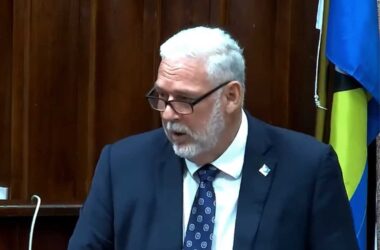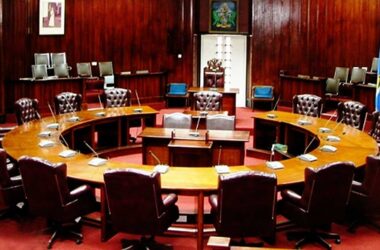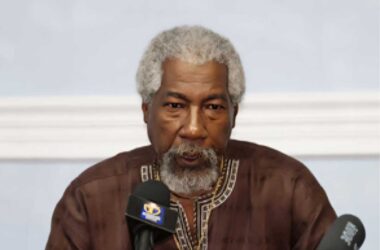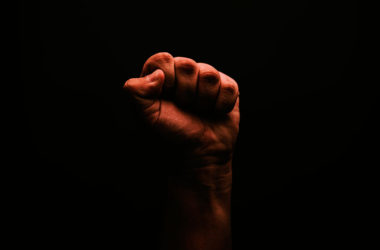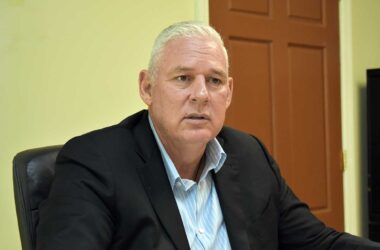
IT’S the final weekend and just one day left before registered voters flock to polling stations to cast their ballots in Saint Lucia’s most different election ever.
But while voters Joe and Joan sharpen their fingers and get ready for that one day every five years that they are really told they – and their votes — do count, police officers have already voted, as per usual.
But what’s not usual is that we won’t know how they voted unto Monday night.
It used to be that the results of the Police Vote served as a windsock or weather vane, if not a litmus test as to how the rest of the population will vote, leading to the parties keeping their eyes on result. Back then, the police voted at the Port Police Station (now a vacant lot opposite what used to be Valmont’s Bookstore and then Beauty Max) where the Fire Station also stood on Jeremie Street). After the demolition of the police and fire stations, the voting shifted to Police Headquarters or ‘The Barracks’ on Bridge Street.
It used to be that since the police officers voted in Central Castries, their votes were counted and added to that constituency’s tally, but that was soon changed to the present system whereby police still vote the same place on the Friday before elections, voting according to the constituency they live in, the enveloped ballots addressed to the relevant constituency’s polling officials, for counting and addition to the relevant boxes at the same time as everyone else’s vote.
So today, while the police vote on Friday, their votes aren’t counted until Monday evening.
The police vote can no longer be counted on as an election result weather vane, but the importance of the police vote has been no less since the change, the parties appealing to police officers ahead of election according to the issues that affect them – like the IMPACS situation, which was a major elections issue in 2016.
Back then, the UWP, in opposition, campaigned on a position that the Labour administration under Prime Minister Dr. Kenny D. Anthony had somehow wronged the police by deciding to pursue investigations into alleged extrajudicial killings authorized by the previous UWP administration, with then PM Stephenson King and Home Affairs and National security Minister Guy Mayers accused of authorizing Operation Restore Confidence (ORC) that included elimination of 12 persons said to have been on an alleged ‘hit list’ who ended-up dying from police bullets.
The UWP campaigned on a promise to solve the IMPACS troubles within 100 days and while it’s impossible to know whether the police vote was influenced in any way by the parties’ positions, the UWP won the 2016 election.
The 12 police officers accused and the families of the victims, lived in limbo for another five years with no forward movement from the office of the Director of Public Prosecution (DPP), the matter only becoming a public issue once again as the 2021 elections approached – and after the US indicated it would be prepared to ease on the Leahy Law restrictions to allow for needed security assistance.
But the outgoing US Ambassador to Barbados and the eastern Caribbean, while making the welcome announcement here recently, did point out that the US continued to insist that there be judicial traction in the case in terms of the accused officers facing a court of law to determine their guilt.
The IMPACS issue having been made a political one by then the government’s critics after it decided to follow the IMPACS recommendations and pursue a judicial process, the accused 12 officers spent more than the last five years with promotions iced (except in one case) and no sign of when or whether their uncertainty would end.
Then, with less than one week to go before police officers, vote the DPP makes a surprising public announcement: he’s determined there was no basis for charges against five of the accused officer and investigations – which he also pointed out can also continue indefinitely – are continuing into the other seven cases, five years after he was appointed, with added post benefits, the nation told he would have delivered progress on the IMPACS matter.
The DPP’s verdict means that five of the accused won’t face courts and the other seven investigations will continue – indefinitely…
Whether whichever new government emerges from the elections will most likely be bound by the DPP’s decision, but the extent to which it will go down well with the US State Department officers policing the Leahy Act is left to be seen.
Democratic Congressman Patrick Leahy (after who the Act was named), is a most senior congressman in the Biden administration and the extent to which he will be able to influence the policing of the act in his name is also left to be seen.
Under the Biden administration, the US is most likely to provide the spare parts and other technical assistance needed to float the island’s coast guard (Police Marine Unit) effectively enough to patrol and guard the island’s coastal borders and senior police officers may again start getting invitations to meeting in and funded by the US.
But when it comes to implementation of US sanctions against states Washington’s rulers accuse of engaging in or tolerating extrajudicial killings by army and police, that’s a totally different matter. Canada, France, UK and the European Union (EU) are also all-in on the long years of sanctions pressure against Saint Lucia’s royal police force and getting them to back-down is easier said than done, never mind their own related records in how they handle extrajudicial killings and never having to face sanctions.
It would have been far-fetched to have expected that the police would have voted yesterday in accordance with the DPP’s ruling, but it wouldn’t be at all off-track to expect that the DPP will strenuously deny that the timing of his IMPACS announcement was intended to impact how the officers voted.
But then, with police votes sent to and counted among those in the relevant ballot boxes at the polling stations they are registered to vote in, it’ll be virtually and practically impossible to know how each officer voted, far less the majority.
Meanwhile, having voted, the police officers are this weekend again on the beat policing their first COVID election and related protocols in a carnival-style atmosphere in which all campaigners for all parties and candidates are playing Ole Mas as they jump-up for the Last Lap before Judgment Day on Monday and a definite J’Ouvert on Tuesday morning, when after a long night for all, it will be only be alright in the morning for some!



